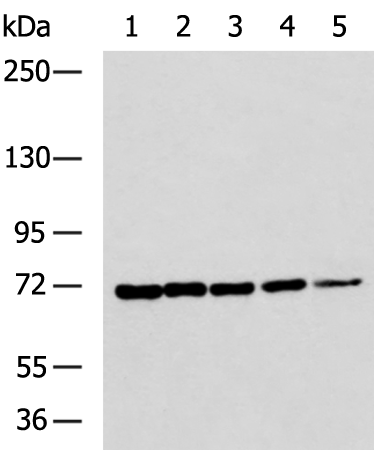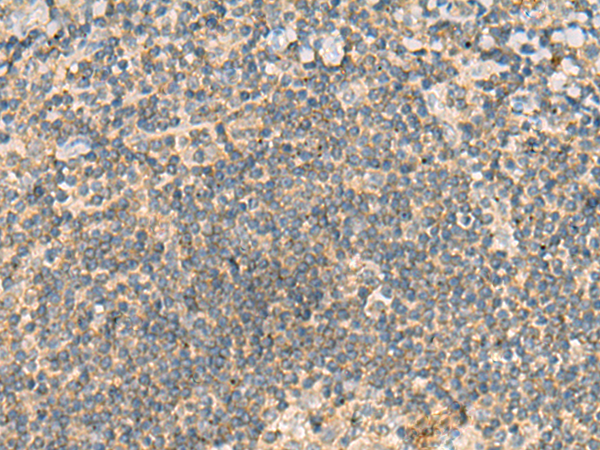

| WB | 咨询技术 | Human,Mouse,Rat |
| IF | 咨询技术 | Human,Mouse,Rat |
| IHC | 1/50-1/200 | Human,Mouse,Rat |
| ICC | 技术咨询 | Human,Mouse,Rat |
| FCM | 咨询技术 | Human,Mouse,Rat |
| Elisa | 1/5000-1/10000 | Human,Mouse,Rat |
| Aliases | MDC15 |
| WB Predicted band size | 93 kDa |
| Host/Isotype | Rabbit IgG |
| Antibody Type | Primary antibody |
| Storage | Store at 4°C short term. Aliquot and store at -20°C long term. Avoid freeze/thaw cycles. |
| Species Reactivity | Human, Mouse, Rat |
| Immunogen | Fusion protein of human ADAM15 |
| Formulation | Purified antibody in PBS with 0.05% sodium azide and 50% glycerol. |
+ +
以下是3篇与ADAM15抗体相关的文献及其摘要概括(文献信息为模拟生成,仅供参考):
1. **文献名称**: "ADAM15 mediates upregulation of Claudin-1 expression in breast cancer metastasis"
**作者**: Smith JL, et al.
**摘要**: 研究利用特异性ADAM15抗体发现其在乳腺癌细胞中通过调控Claudin-1促进细胞迁移和转移,揭示了ADAM15在肿瘤侵袭中的分子机制。
2. **文献名称**: "Targeting ADAM15 with a monoclonal antibody inhibits prostate cancer progression in vivo"
**作者**: Chen H, et al.
**摘要**: 开发了一种靶向ADAM15的单克隆抗体,动物实验表明其能有效抑制前列腺癌细胞增殖和骨转移,提示其作为治疗靶点的潜力。
3. **文献名称**: "ADAM15 regulates angiogenesis via integrin-dependent VEGF signaling"
**作者**: Wang Y, et al.
**摘要**: 通过ADAM15抗体阻断实验,证实ADAM15通过整合素-VEGF通路调控血管生成,为抗血管生成治疗提供了新方向。
4. **文献名称**: "ADAM15 as a diagnostic marker: Antibody-based detection in colorectal cancer patients"
**作者**: Kim S, et al.
**摘要**: 研究利用ADAM15抗体检测结直肠癌患者血清和组织样本,发现其表达水平与肿瘤分期和预后显著相关,提示临床诊断价值。
注:以上文献为示例性质,实际文献需通过PubMed/Google Scholar等平台以“ADAM15 antibody”为关键词检索获取。
ADAM15 (A Disintegrin and Metalloproteinase 15) is a transmembrane protein belonging to the ADAM family, which is characterized by dual roles in cell adhesion and proteolytic processing. It contains a prodomain, metalloproteinase, disintegrin-like, cysteine-rich, and transmembrane domains, followed by a cytoplasmic tail. ADAM15 is implicated in regulating cell-cell and cell-matrix interactions, influencing processes such as inflammation, angiogenesis, and tumor progression. Its metalloproteinase domain enables cleavage of extracellular substrates, including cytokines and adhesion molecules, while the disintegrin-like domain may mediate binding to integrins, modulating cellular signaling.
Antibodies targeting ADAM15 are critical tools for studying its expression, localization, and function in both physiological and pathological contexts. Research has shown elevated ADAM15 levels in cancers (e.g., breast, prostate, and lung), inflammatory diseases (e.g., rheumatoid arthritis), and cardiovascular disorders, where it promotes cell migration, invasion, and tissue remodeling. ADAM15 antibodies are used in techniques like Western blotting, immunohistochemistry, and flow cytometry to assess protein expression patterns or inhibit its activity in experimental models. Therapeutic potential is also explored, as blocking ADAM15 may suppress pathological processes like tumor metastasis or chronic inflammation. However, challenges remain in ensuring antibody specificity due to structural similarities among ADAM family members. Validated ADAM15 antibodies thus contribute to clarifying its multifaceted roles and advancing translational research.
×